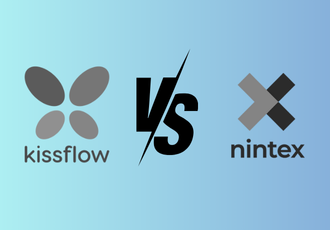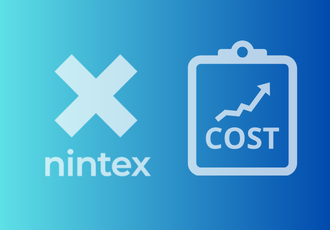As digital transformation increasingly drives the success of global organizations, citizen development has emerged as a strategy for accelerating the digital agenda and cultivating a culture of innovation. Both of these are essential for organizations aiming to compete and thrive in the digital era.
In this blog, we will offer a comprehensive guide to citizen development, equipping you with the essential knowledge to evaluate it as a pathway for accelerating digital transformation and cultivating a culture of innovation within your organization.
We'll also argue that citizen development is not only essential, but also represents the future of work in an era where no code tools will become as commonplace as laptops within organizations. Let’s get started.
What is citizen development?
According to Gartner, a citizen developer is a business user who creates application capabilities for consumption by themselves or others.
In the FlowForma world, citizen development is a strategic initiative to empower non-IT business users to automate processes at scale without having prior coding knowledge.
Empowerment is the key word here as the potential benefits of citizen development to impact innovation, digital transformation and process improvement are truly significant.
No code platforms are an enabler for citizen development, as they provide non-IT business users a tool to quickly automate processes in a user-friendly visual environment that is accessible to all.
Although coding skills are not needed, IT will need to provide the infrastructure for the citizen developers. This will drive technology standards and provide guardrails to ensure citizen developers can build solutions without risk to the business. Citizen development tools will also be required to digitalize processes across the business.
Learn more about citizen development with key insights from FlowForma's Product Evangelist Paul Stone
Why does an organization need citizen development?
In today’s hyper-competitive economy, organizations are faced with skills shortages, budget cuts and increased digital transformation targets.
Citizen development initiatives provide business leaders with a fast-track route to address these challenges by scaling digital process automation, without the costly overhead of hiring a team of developers.
Cost savings and productivity
A team of citizen developers deploying no code platforms at full pace will provide cost savings, and productivity improvement and ultimately lead to increased profits for the business.
As citizen development gains wider adoption and integration across various business areas, organizations will foster a stronger culture of innovation, providing the competitive edge needed to thrive as a digital-first leader.
Shadow IT
The phrase ‘shadow IT’ has emerged in the digital age due to the proliferation of digital technologies and tools in the workplace. Shadow IT is the use of software, tools, and apps by workers outside of the safeguards of IT.
There are risks with shadow IT including security and data inaccuracy while citizen developers are governed by IT, providing the guardrails to administer no code platforms and prevent shadow IT.
Skills shortage
According to EY, 81% of organizations are encountering a shortage in “developer” tech skills. Citizen development provides IT professionals with additional resources to fuel digital process automation projects, without the need to hire developers. This is achieved by empowering business users to automate processes without the need for coding skills.
A use case of citizen application development
Among a large number of successful citizen development projects supported by FlowForma is the Liverpool School of Tropical Medicine (LSTM).
LSTM is the oldest school of tropical medicine in the world, with hundreds of staff working across the globe. LSTM engaged FlowForma to deploy its process automation tool and scale digitalization via a citizen developer program.
LSTM has launched 65 workflows in the 14 months since FlowForma Process Automation was deployed. An organization that was once “awash with paper form-based processes” is seeing huge efficiency gains.
To achieve these results, 60 employees went on training and were fully ‘bought in’ to the citizen developer methodology.
There was a huge culture shift in the organization with support from executives to empowering citizen developers. This has resulted in every department automating processes and achieving productivity gains, cost savings and accelerating digitalization in the business.
Read the full case Liverpool School of Tropical Medicine study here.
Learn more about the future trends of citizen development with key insights from the technology leaders at FlowForma.
Who are citizen developers and what do they do?

Source: Create A Governance Strategy To Meet The Process Imperative
Let’s take a look at the roles involved in deploying a successful citizen development program:
.png?width=148&height=148&name=Business%20Process%20Automation%20Trends%20in%202024%20(4).png) Business expert:
Business expert:
Business experts are the workers who understand the processes that are in the business. They are often on the front line and will have intimate knowledge of the complexities of the business, the stakeholders involved and the policies and procedures to follow.
Executive sponsor
Every citizen developer program will need to have an executive sponsor to drive its success. Business leaders drive the strategic goals of citizen development and will be positioned to analyse the outcomes and ROI achieved from the initiative.
Citizen development champion
The role of the citizen developer champion is to promote the program within the business. They will also promote the culture change required for a successful program.
Technology governor
IT is typically the key role positioned to govern citizen development and app development. IT will act as a gatekeeper to ensure that no code platforms are properly tested before they're brought into the live environment. They will also safeguard security and user access where required.
Change manager
A change manager can help the executive sponsor promote the citizen developer program. They will also encourage the adoption of the digital process automation tool within the business, a key factor in the success or failure of the citizen development program.
Technology expert
The technology expert will advise business experts on technical issues, integrations and scaling digital process automation with the right application development tools. They may also be involved in the procurement process of a digital process automation tool.
Process expert
The process expert advises on the best approach to process optimization and improvement. They will have deep knowledge of process mapping, to fast-track goals across the business.
Customer experience pro
Organizations that involve external parties such as customers and suppliers in their processes are typically managed by customer experience professionals. Customer experience professionals are involved to ensure compliance standards, minimize the risk to the business, and ensure optimal experience for the external parties.
Skills requirement for a citizen developer
Citizen developers are business users who have a deep understanding of the processes they work with daily. Soft skills are crucial for these citizen developers.
Skills include:
Curiosity and problem-solving:
Citizen developers have a natural appetite to uncover bottlenecks in processes, want to continually improve and are proactive in developing solutions to problems.
Digital natives:
Citizen developers are digital nativists and early adopters of technology. They are open to using digital tools to make work faster, more efficient, and productive.
Continuous learning:
They have a hunger for learning new technology, techniques and processes. Citizen developers are open to learning new ways of working and using digital tools to enhance their work.
Professional developers vs citizen developers
There are key differences between professional developers and citizen developers. We have included the key differences here below:
Citizen Development Basic Framework
According to Forrester, there are three key frameworks for citizen development.
The privateer framework
A team of citizen developers will digitalize processes autonomously within an organization. IT will provide the guardrails for the digital platform and the team of citizen developers will report to senior executives in the business. There are limitations to this framework as the team will not be able to scale digitalization company-wide.
The democracy
This framework empowers workers across a company to digitalize simple processes. The goal of this framework is to eliminate manual processes such as spreadsheets and paper forms.
The enterprise will need to establish an IT centre of excellence (COE) to provide training and support to the team of citizen developers. It is essential to find tech-savvy workers who are open to learning new digital technologies to ensure this framework is a success.
The federation
A Center of Excellence (COE) supports a structured spectrum of use cases and developers. In this model, the central COE manages the platform and its guardrails, defining various development processes for different use cases and personas.
Professional developers, process champions, and citizen developers all use the same digital platform. This approach likely represents the ideal model, with a spectrum of developers collaborating on a wide variety of use cases. It is a logical evolution, combining elements of the privateer and democracy models. This is the model we recommend to our customers at FlowForma.
Pros and cons of citizen development
Pros
Solve IT skills shortage
As widely reported, there is a global shortage of developers. Citizen development can help address these challenges by scaling no code digital process automation initiatives without the need to hire additional developers. This will have significant cost and resource savings for an IT department.
Reduce costs
Significant cost savings can be achieved by the productivity gains achieved from a citizen development no code process automation program.
Collaboration
Improve collaboration across functions was team members work together on launching and improving business processes.
Cons
Executive backing
Executives will need to report of the ROI achieved from the program, adding to a long list of KPIs and dashboards.
Resources
A successful citizen development program needs to be adequately resourced. This will take workers' time away from other daily tasks in the business.
Learning
While coding skills are no required for a no code tool, there will be training required for citizen developers.
Conclusion
In today’s business landscape where technology is a driving factor for success, citizen development is emerging as the key strategy for competitive advantage, scaling digitalization and harnessing the power of a digital culture mindset.
According to a recent Gartner report, 61% of companies already have or are planning to have citizen developer initiatives. With many organizations already reaping the benefits, we foresee a future where citizen development is one of the key pillar corporate strategies.
No matter where you are on your citizen development journey, we invite you to uncover the opportunities for your organization by speaking with our team of no code digital process automation experts. Get in touch today to learn more about citizen development for your organization.
Or are you ready to start digitalizing processes today? Get started with a free 14-day free trial of FlowForma Process Automation (fill in the form below to get started!)
.jpg) By
By 
.png?width=148&height=148&name=Business%20Process%20Automation%20Trends%20in%202024%20(5).png)
.png?width=148&height=148&name=Business%20Process%20Automation%20Trends%20in%202024%20(6).png)
.png?width=148&height=148&name=Business%20Process%20Automation%20Trends%20in%202024%20(8).png)
.png?width=148&height=148&name=Business%20Process%20Automation%20Trends%20in%202024%20(13).png)
.png?width=148&height=148&name=Business%20Process%20Automation%20Trends%20in%202024%20(9).png)
.png?width=148&height=148&name=Business%20Process%20Automation%20Trends%20in%202024%20(12).png)
.png?width=148&height=148&name=Business%20Process%20Automation%20Trends%20in%202024%20(10).png)




